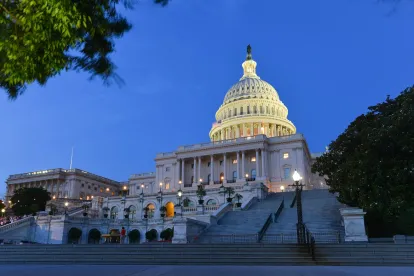This is a weekly post spotlighting labor topics in focus by the US legislative and executive branches during the previous week. In this issue, we cover:
-
American Jobs Plan Unveiled
-
Responses to the Plan
-
Joint Employment Rule Update
-
Form T-1 Trust Annual Report Filing | Non-Enforcement Decision
American Jobs Plan Unveiled
On Wednesday, March 31, U.S. President Joe Biden outlined roughly a $2 trillion legislative proposal – the American Jobs Plan (“the Plan”) – that would be spread over eight years to build back better the American economy from the impact of the COVID-19 pandemic. The President called it a “once-in-a generation investment in America” that would create skilled jobs, grow the economy, make the country more competitive globally, promote U.S. national security interests, and position the United States to be competitive with China. Among other things, the Plan would create jobs that pay prevailing wages in safe and healthy workplaces while ensuring workers have a free and fair choice to organize, join a union, and bargain collectively with their employers. A White House fact sheet on the Plan is available here.
With respect to labor provisions, the President is calling on Congress to invest:
-
$100 billion in workforce development programs targeted at underserved groups and getting students on paths to careers before they graduate from high school;
-
$40 billion investment in a new Dislocated Workers Program and sector-based training;
-
$48 billion in American workforce development infrastructure and worker protection; and
-
$10 billion investment for enforcement of the Plan’s workforce proposals.
President Biden is also calling on Congress to:
-
Ensure that new jobs created in clean energy, manufacturing, and infrastructure are open and accessible to women and people of color;
-
Provide funding for job training for formerly incarcerated individuals and justice-involved youth and in improving public safety;
-
Address long-term unemployment and underemployment through a new subsidized jobs program;
-
Eliminate sub-minimum wage provisions in section 14(c) of the Fair Labor Standards Act;
-
Expand access to competitive, integrated employment opportunities and fair wages for workers with disabilities;
-
Ensure all workers have a free and fair choice to join a union by passing the Protecting the Right to Organize (PRO) Act, and guarantee union and bargaining rights for public service workers;
-
Tie federal investments in clean energy and infrastructure to prevailing wages and require transportation investments to meet existing transit labor protections;
-
Include a commitment to increasing American jobs through Buy America and Ship American provisions; and
-
Increase penalties when employers violate workplace safety and health rules.
Speaker of the House Nancy Pelosi (D-California) has reportedly told her Caucus that she intends to advance the infrastructure proposal through the lower chamber by the Fourth of July. While not yet confirmed, many believe Democrats are aiming to advance the Plan via the budget reconciliation process used for the American Rescue Plan, a tool that allows a simple majority vote in both chambers of Congress.
Responses to the Plan
House Education & Labor Committee Chairman Bobby Scott (D-Virginia) issued a statement welcoming the American Jobs Plan. He said,
The Biden Plan will get struggling Americans back to work by making unprecedented and long-overdue investments in programs that are proven to help workers develop in-demand skills that prepare them for rewarding careers. . . . The infrastructure plan also keeps President Biden’s promise to build back a better economy where workers can earn decent wages and have a voice in their workplace.”
Secretary of Labor Marty Walsh said of the Plan in a statement:
This plan is what building back better looks like – 21st-century infrastructure including rail, roads, bridges and broadband; clean energy and drinking water for healthy communities; expanded job training and apprenticeships, so workers can take control of their futures; research and development to grow good manufacturing jobs; investment in the essential care professions that our families and communities depend on; and equity for historically marginalized communities, so nobody gets left out.”
House Ways & Means Committee Republicans characterized the Plan as a “job-killing tax plan,” arguing the proposed increased taxes will result in American jobs lost and decreased American wages. Senate Finance Committee Ranking Member Mike Crapo (R-Idaho) echoed his House Republican colleagues, saying:
Hastily changing the tax system purely for purposes of raising revenue will bring back inversions and foreign takeovers of U.S. companies, cost jobs, shrink domestic investment and slow down wage growth, ultimately crushing ordinary workers and the middle class. Focusing on pro-growth policies that boost growth, competitiveness, productivity and investment is the best way to fully rebuild from the COVID-19 pandemic.”
Joint Employment Rule Update
On Wednesday, March 31, the Biden Administration asked U.S. Court of Appeals for the Second Circuit to postpone a case over the Trump Administration joint employment rule to allow the U.S. Labor Department time to rescind the regulation. A coalition of business groups intervening in the litigation to defend the rule has objected to a delay.
Form T-1 Trust Annual Report Filing | Non-Enforcement Decision
House Education & Labor Committee Republican Leader Virginia Foxx (R-North Carolina) issued a statement following the Department of Labor’s announcement it would not enforce an Office of Labor-Management Standards (OLMS) rule related to labor union assets, including trusts. She said,
Union members deserve to know how union bosses are spending union funds, especially considering recent federal investigations uncovered nearly a decade of corruption at one of the largest unions in the country, which included money laundering, tax fraud, bribery, and the embezzlement of workers’ hard-earned union dues for lavish personal expenses.”
The OLMS will publish notice of an intended rulemaking to propose rescission of the March 2020 final rule in the spring 2021 Semi-Annual Regulatory Agenda.





 />i
/>i

